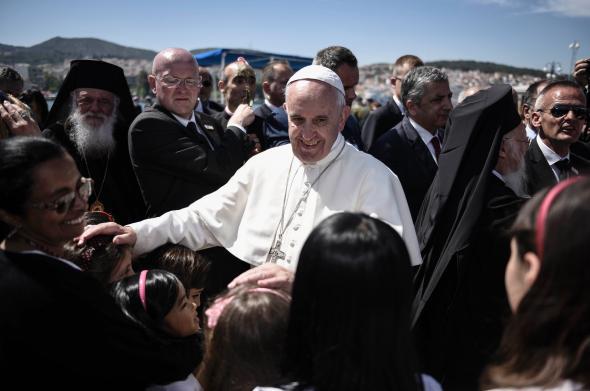Pope Francis is a remarkable religious leader in part because he acts more like a jazz soloist than a marching-band leader. Instead of guiding his followers through practiced routines based on a shared score, he riffs alone and then traipses backwards, making up his own melodies and repeating old themes in new keys. He’s a joy to listen to, even—or especially—if you have no idea where he’s going.
Last week, Francis casually improvised on a favorite theme when he remarked that “the great majority” of Catholic sacramental marriages are invalid, or null. As the Catholic News Agency reported, he blamed a contemporary “culture of the provisional” that puts people in a mindset where everything is temporary. “They say ‘yes, for the rest of my life!’ but they don’t know what they are saying,” the pope said, answering an audience question after an address to the Diocese of Rome. “They say it, they have good will, but they don’t know.” He invoked a young man he had heard about who wanted to become a priest—another lifetime vow, ostensibly—but for only 10 years; he also remarked that some cohabiting couples have “the grace of a real marriage” because of their faithfulness.
So a religious leader is lamenting that kids these days don’t take marriage seriously. What else is new? To understand how shocking this is, a quick primer on the concept of “Catholic marriage,” which means more than just a marriage of two Catholics. To be viewed as properly married by the church, Catholics must fulfill a number of requirements, including having “the intention to marry for life, to be faithful to one another, and be open to children.” So for the pope to say most Catholic marriages are not valid is much more serious than saying “most people don’t take marriage seriously.”
Catholicism frames marriage somewhat paradoxically as both a totally natural human state and one that requires hitting specific marks to attain. In one fell swoop, the pope appeared to suggest that the majority of well-meaning everyday Catholics cannot successfully achieve true marriage—and, by the way, is it really so important anyway?
Conservative Catholics are not pleased with this, to put it mildly. New York Times columnist Ross Douthat, already a sharp critic of the pope’s approach to marriage, unleashed a 21-part tweetstorm. “From a Catholic perspective, the West’s obvious problem is too few marriages, not too many invalid ones,” Douthat wrote, lamenting the pope’s “weird and un-Catholic counsel of despair.” Another influential observer compared the implications of the pope’s remarks to a “nuclear winter.”
Three years into Francis’s papacy, it’s getting hard for some of his critics to conceal their disdain for his style. “It turns out that the pope isn’t just unguarded and especially candid,” columnist Michael Brendan Dougherty wrote in The Week. “He’s juvenile and irresponsible. Maybe even a little stupid.” Dougherty continued:
“What if Catholic marriages are mostly shams, and the sham marriages are mostly Catholic?” is a sophomoric, dorm-room level effusion. And it would be good for a laugh, save for the fact that this was the freaking pope expressing his Olympian contempt for his co-religionists. In effect, he told millions of Catholics that they are not just unmarried, but were incapable of being married, because the modern world has corrupted them and because the Church failed to “catechize” them. This is a view of such sour pessimism, it is hard not to spit.
Hold the spit for now. The Vatican rapidly “clarified” Francis’s remarks, revising the official transcript of the remarks to say that it’s only “a portion” of Catholic marriages that are null, not necessarily “a great majority.” A Vatican spokesman explained that transcripts of the pope’s spontaneous remarks are always reviewed for precision, and sometimes revised after the fact with the pope’s approval. The initial comments, in other words, are just temporary. Talk about a “culture of the provisional.”
